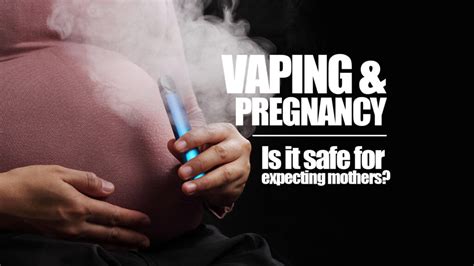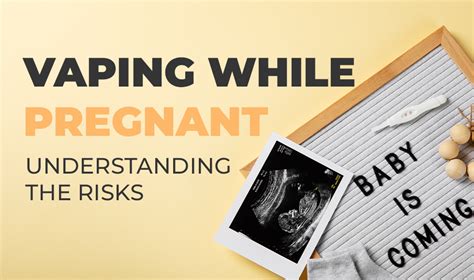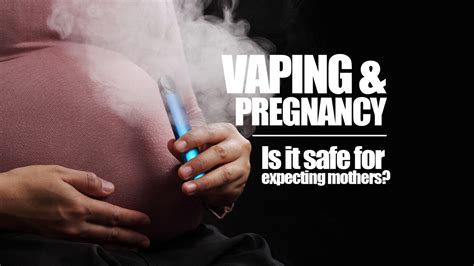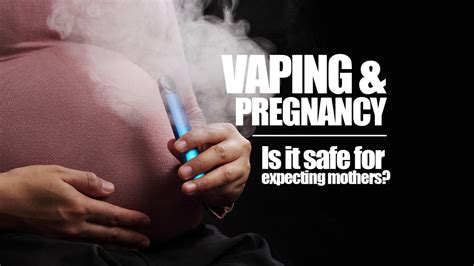Intro
Discover the dangers of vaping while pregnant, including nicotine risks, e-liquid toxicity, and birth defect concerns, to protect your unborn babys health and well-being.
The use of e-cigarettes, commonly known as vaping, has become increasingly popular over the past decade. Despite its growing popularity, there is still much to be learned about the potential risks associated with vaping, particularly for vulnerable populations such as pregnant women. Expectant mothers are often advised to avoid any substance that could potentially harm their unborn child, and vaping is no exception. In fact, the risks of vaping while pregnant are a topic of great concern among healthcare professionals and researchers.
Pregnancy is a critical period of development for the fetus, and exposure to harmful substances can have long-lasting effects on the child's health and well-being. While some may view vaping as a safer alternative to smoking traditional cigarettes, the reality is that e-cigarettes still contain a cocktail of chemicals that can be detrimental to fetal development. The nicotine present in e-liquids, for example, is a known teratogen, meaning it can cause birth defects and other developmental problems. Furthermore, the flavorings and other additives in e-liquids have been shown to be toxic to human cells, making them a potential risk factor for pregnancy complications.
The importance of understanding the risks of vaping while pregnant cannot be overstated. As the number of expectant mothers who vape continues to rise, it is essential that healthcare providers and pregnant women themselves are aware of the potential dangers associated with e-cigarette use during pregnancy. This knowledge can help inform decisions about vaping and encourage pregnant women to seek alternative, safer methods for managing stress and cravings. By exploring the current research on vaping during pregnancy, we can better understand the risks and work towards creating a healthier, safer environment for expectant mothers and their unborn children.
Vaping and Pregnancy: An Overview

Vaping during pregnancy is a complex issue, and there are many factors to consider when evaluating the potential risks. One of the primary concerns is the presence of nicotine in e-liquids, which can have a range of negative effects on fetal development. Nicotine is a highly addictive substance that can cross the placenta and enter the fetal bloodstream, where it can interfere with normal development and increase the risk of birth defects. Additionally, nicotine has been shown to affect fetal brain development, potentially leading to cognitive and behavioral problems later in life.
Nicotine and Fetal Development
- Nicotine can cross the placenta and enter the fetal bloodstream
- Nicotine can interfere with normal fetal development and increase the risk of birth defects
- Nicotine can affect fetal brain development, potentially leading to cognitive and behavioral problems
In addition to nicotine, e-liquids often contain a range of other chemicals, including flavorings and additives. These substances can be toxic to human cells and have been linked to a range of health problems, including respiratory disease and cancer. When inhaled, these chemicals can enter the bloodstream and potentially harm the developing fetus. Furthermore, the heating coils used in e-cigarettes can release heavy metals, such as lead and cadmium, which are known to be toxic to human health.
Risks of Vaping During Pregnancy

The risks of vaping during pregnancy are numerous and well-documented. Some of the most significant risks include:
- Birth defects: Nicotine and other chemicals in e-liquids can increase the risk of birth defects, particularly those affecting the heart and brain.
- Low birth weight: Vaping during pregnancy has been linked to lower birth weights, which can increase the risk of health problems for the baby.
- Preterm birth: Vaping during pregnancy can increase the risk of preterm birth, which can lead to a range of health problems for the baby.
- Respiratory problems: Exposure to the chemicals in e-liquids can increase the risk of respiratory problems, such as asthma and chronic obstructive pulmonary disease (COPD).
Pregnancy Complications
- Vaping during pregnancy can increase the risk of pregnancy complications, including preeclampsia and gestational diabetes
- Vaping during pregnancy can increase the risk of stillbirth and miscarriage
- Vaping during pregnancy can increase the risk of fetal growth restriction, which can lead to low birth weight and other health problems
Alternatives to Vaping During Pregnancy

For expectant mothers who are struggling with nicotine cravings or stress, there are several alternatives to vaping that can help manage these symptoms. Some of the most effective alternatives include:
- Nicotine replacement therapy (NRT): NRT can help manage nicotine cravings and is available in a range of forms, including gum, lozenges, and patches.
- Counseling: Counseling can help expectant mothers manage stress and develop coping strategies to deal with nicotine cravings.
- Support groups: Support groups can provide a sense of community and connection for expectant mothers who are struggling with nicotine addiction.
- Medications: In some cases, medications such as bupropion (Zyban) or varenicline (Chantix) may be prescribed to help manage nicotine cravings.
Managing Nicotine Cravings
- Stay hydrated by drinking plenty of water
- Engage in physical activity, such as walking or yoga
- Practice relaxation techniques, such as deep breathing or meditation
- Avoid triggers, such as smoking or vaping environments
Conclusion and Next Steps

In conclusion, the risks of vaping during pregnancy are significant and well-documented. Expectant mothers who vape are putting their unborn children at risk of a range of health problems, including birth defects, low birth weight, and respiratory problems. By understanding the risks of vaping during pregnancy and exploring alternative methods for managing nicotine cravings and stress, expectant mothers can help create a healthier, safer environment for their unborn children.
We invite you to share your thoughts and experiences with vaping during pregnancy in the comments below. If you or someone you know is struggling with nicotine addiction, we encourage you to seek support from a healthcare provider or support group.
What are the risks of vaping during pregnancy?
+The risks of vaping during pregnancy include birth defects, low birth weight, preterm birth, and respiratory problems. Nicotine and other chemicals in e-liquids can also affect fetal brain development and increase the risk of cognitive and behavioral problems.
Can I use e-cigarettes to help me quit smoking during pregnancy?
+No, e-cigarettes are not recommended for use during pregnancy. While they may be seen as a safer alternative to traditional cigarettes, they still contain nicotine and other chemicals that can harm the developing fetus.
What are some alternatives to vaping during pregnancy?
+Alternatives to vaping during pregnancy include nicotine replacement therapy (NRT), counseling, support groups, and medications such as bupropion (Zyban) or varenicline (Chantix). These methods can help manage nicotine cravings and reduce the risk of health problems for the baby.
How can I get help if I'm struggling with nicotine addiction during pregnancy?
+If you're struggling with nicotine addiction during pregnancy, talk to your healthcare provider about the best course of treatment. They can recommend alternative methods for managing nicotine cravings and provide support and guidance throughout your pregnancy.
What are some resources for expectant mothers who want to quit vaping?
+Resources for expectant mothers who want to quit vaping include the National Quitline (1-800-QUIT-NOW), text messaging services such as Text4baby, and online support groups and forums. These resources can provide guidance, support, and encouragement as you work to quit vaping and create a healthier environment for your baby.
